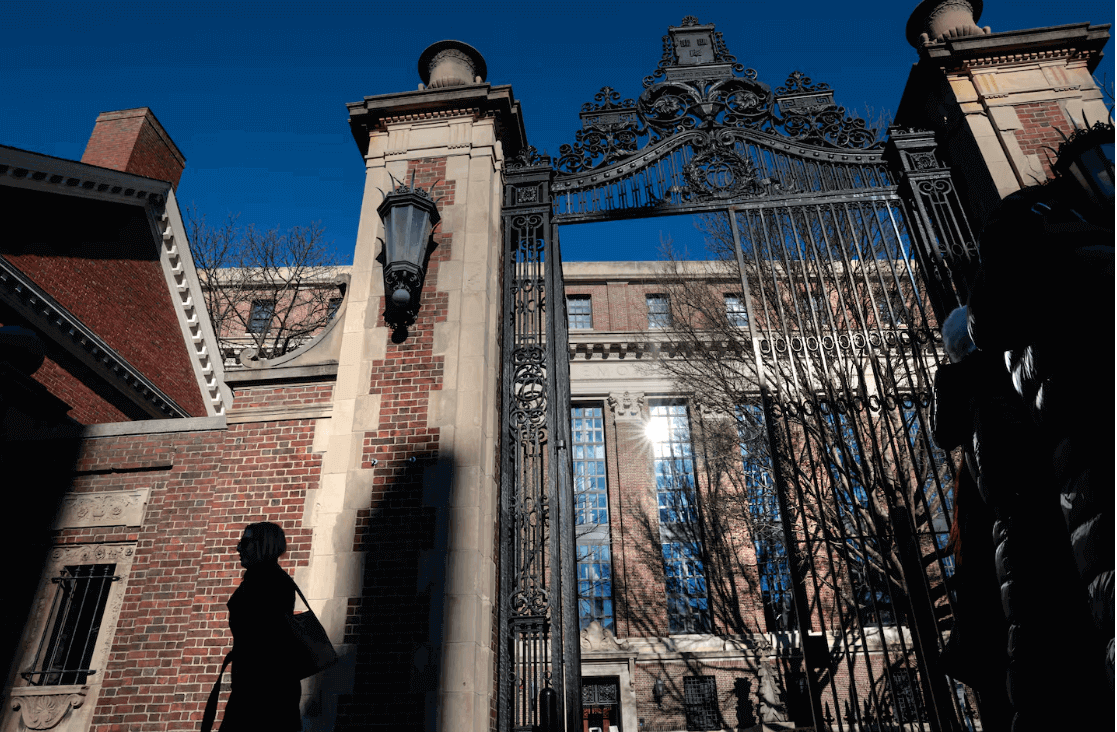数百名哈佛教授呼吁抵制“对美国大学的攻击”

【中美创新时报2025 年 3 月 27 日编译讯】(记者温友平编译)数百名哈佛大学教授周三在致学校管理委员会的一封信中呼吁大学领导反击联邦政府“对美国大学的持续攻击”,并表示高等教育的未来岌岌可危。《波士顿环球报》记者希拉里·伯恩斯和尼克·斯托伊科对此作了下述报道。
截至晚上 7 点左右,已有 590 多人签署了这封信。此时,全国各地的大学都在努力应对一系列调查和资金威胁,这相当于对该国高等教育部门进行了一次非同寻常的打击。《波士顿环球报》于周三获得了这封信,这是 学术界迄今为止最引人注目的抵制政府政策的行动之一。
上周,哥伦比亚大学同意了特朗普政府提出的几乎所有要求,此前特朗普政府指责这所常春藤盟校处理抗议活动和校园反犹太主义问题不当。特朗普政府下令改变哥伦比亚大学处理学生纪律、校园安全甚至其中一个学术部门的方式。几天前,美国政府削减了对哥伦比亚大学 4 亿美元的资助,称这些条款是“哥伦比亚大学与美国政府继续保持财务关系的正式谈判的先决条件”。
美国政府及其盟友认为,许多高等教育机构,特别是哥伦比亚大学和哈佛大学这样的精英院校,已经放弃了培养爱国公民的使命,反而向学生灌输左派思想,必须予以纠正。
哥伦比亚大学对政府条款的默许引起了学术界的广泛担忧,他们担心大学领导者正在向联邦政府屈服,并在此过程中危及学术自由。
哈佛大学教职员工的公开信中没有提到特朗普总统的名字,但信中表示,“对美国大学的持续攻击威胁到民主社会的基本原则,包括言论自由、结社自由和探究自由的权利”。
签署这封信的哈佛大学历史和非裔美国人研究教授文森特·A·布朗在周三的采访中表示,他之所以这么做,是因为担心哥伦比亚大学的让步决定“只会鼓励校方提出更多要求”。他承认,校方正处于“不可能的境地”,但他强烈认为“投降”不会奏效。
“教师们为大学担心,”布朗说。“他们担心自己不能以学生想要的方式教学,不能以学生想要的方式表达他们的想法。”
信中呼吁哈佛大学最高管理委员会哈佛公司和大学监事会“公开谴责对大学的攻击”并“依法抗辩并拒绝遵守威胁学术自由和大学自治的非法要求”。
此外,这封信还呼吁大学领导“与其他大学和哈佛大学自己的校友网络合作,协调反对这些反民主的攻击。”
哈佛大学发言人没有立即回应置评请求。
哈佛大学历史学教授克尔斯滕·韦尔德表示,美国高等教育界的各所高校都倾向于效仿哈佛的做法,“无论好坏”。因此,哈佛大学有责任在此时带领同行“团结起来,而不是被逐个击破”,韦尔德说。
哈佛大学访问学者、普林斯顿大学休假教授哈利勒·纪伯伦·穆罕默德 (Khalil Gibran Muhammad) 表示,与高等教育界的领导者协调抵制是有效应对特朗普政府的唯一方法。他说,他很失望,因为更多的大学领导者没有更有力地反对特朗普的高等教育政策。
穆罕默德担心哥伦比亚大学为“这个国家的每一所私立机构树立了一个危险的先例”,并表示联邦政府不应该被允许用政府合同“敲诈任何组织”。
“独裁主义从沉默和恐惧中汲取氧气和力量,”穆罕默德说。“除非人们选择抵抗、选择诉讼、选择抗争,否则这列火车是不会停下来的。”
近几周,特朗普政府拘留了数名国际学生和教职员工,并威胁要削减数十亿美元的研究经费,这在大学校园引起了广泛恐慌。包括哈佛大学在内的几所波士顿地区的学校已宣布冻结招聘和削减其他开支,这表明联邦资金存在不确定性。
包括教育部和司法部在内的多个政府机构表示,全国数十所校园将因多元化项目和反犹太主义而面临调查。
对于一些教授来说,特朗普对高等教育的攻击相当于一场生存危机。
哈佛法学院法学教授安德鲁·曼努埃尔·克雷斯波表示,他担心公众错误地认为美国大学将永远是“世界的榜样”。几十年来,美国各政治派别的政客普遍认为,大学需要“学术自由”,才能“不受政治干预地进行研究”,他说。但现在,大学的自由正受到“攻击”,他担心特朗普政府可能会造成无法弥补的伤害。
“现在是捍卫高等教育的时候了,现在是捍卫哈佛的时候了,”克雷斯波说。“如果我们现在不采取立场,我们可能会永远失去这些机构。”
《波士顿环球报》的迈克·达米亚诺对本报告做出了贡献。
题图:2023 年 12 月,一名行人经过剑桥马萨诸塞大道哈佛园的大门。《波士顿环球报》记者Craig F. Walker
附原英文报道:
Hundreds of Harvard professors call for resistance of ‘attacks on American universities’
By Hilary Burns and Nick Stoico Globe Staff,Updated March 26, 2025, 4:04 p.m.
A pedestrian passes a gate to Harvard Yard on Massachusetts Ave. in Cambridge in December 2023. Craig F. Walker/Globe Staff
Hundreds of Harvard professors on Wednesday called on university leaders to push back against the federal government’s “ongoing attacks on American universities,” saying in a letter to the school’s governing boards that the future of higher education is at stake.
The letter, signed by more than 590 people as of about 7 p.m., comes as universities across the country are grappling with a litany of investigations and funding threats that amount to an extraordinary crackdown on the country’s higher education sector. The letter, which the Globe obtained on Wednesday, marks one of academia’s most high-profile acts of resistance against the administration’s policies so far.
Columbia University last week agreed to nearly every demand made by the Trump administration after it accused the Ivy League school of mishandling protests and campus antisemitism. The administration ordered changes in how Columbia handles student discipline, campus security, and even one of its academic departments. The government, which had cut $400 million in funding from the university days before, called its terms “a precondition for formal negotiations regarding Columbia University’s continued financial relationship with the United States government.”
The administration and its allies believe many higher education institutions, especially elite ones like Columbia and Harvard, have abandoned their mission to produce patriotic citizens and instead indoctrinate their students with leftist ideology, and must be brought to heel.
Columbia’s acquiescence to the administration’s terms elicited widespread concern across academia that university leaders were capitulating to the federal government, and jeopardizing academic freedom in the process.
The Harvard faculty letter does not mention President Trump by name, but it says ongoing ”attacks on American universities threaten bedrock principles of a democratic society, including rights of free expression, association, and inquiry.”
Harvard history and African American studies professor Vincent A. Brown, who signed the letter, said in an interview Wednesday he did so for fear that Columbia’s decision to concede will “only encourage the administration to ask for more.” He acknowledged that college administrators are in an “impossible situation” but feels strongly that “capitulation” won’t work.
“Faculty are afraid for the university,” Brown said. “They are afraid that they are not going to be able to teach students in the way they want to teach; to speak their minds in the way they want to speak.”
The letter calls on the university’s top governing board, the Harvard Corporation, and the university’s Board of Overseers to “publicly condemn attacks on universities” and “legally contest and refuse to comply with unlawful demands that threaten academic freedom and university self-governance.”
Additionally, the letter calls on university leaders to “work with other universities and Harvard’s own alumni networks to mount a coordinated opposition to these anti-democratic attacks.”
Spokespeople for Harvard did not immediately respond to a request for comment.
Institutions across the US higher education sector tend to follow Harvard’s lead, “for better or worse,” said Kirsten Weld, a Harvard history professor. The university, therefore, has an obligation to lead its peers in this moment “to stand up together rather than being picked off one by one,” Weld said.
Coordinating with leaders across higher education to resist is the only way to respond effectively to the Trump administration, said Khalil Gibran Muhammad, a visiting scholar at Harvard who is on sabbatical from Princeton University. He said he is disappointed more university leaders have not spoken out more forcefully against Trump’s higher education policies.
Muhammad fears that Columbia has set a “dangerous precedent for every private institution in this country,” and said the federal government should not be permitted to “extort any organization” with government contracts.
“Authoritarianism gains oxygen and strength from silence and fear,” Muhammad said. “There’s no stopping this train, unless people choose to resist, choose to litigate, choose to fight.”
The Trump administration has caused widespread panic on university campuses in recent weeks as it detained a handful of international students and faculty members, and threatened billions in research funding cuts. Several Boston-area schools, including Harvard, have announced hiring freezes and other cutbacks, pointing to the uncertainty around federal funding.
Several government agencies, including the Department of Education and the Department of Justice, have said dozens of campuses across the country would face investigations for diversity programs and antisemitism.
For some professors, Trump’s attacks on higher education amount to an existential crisis.
Andrew Manuel Crespo, a law professor at Harvard Law School, said he worries that the public wrongly assumes that American universities will always be the “model for the world.” For decades, US politicians across the political spectrum have widely understood that universities require “academic freedom” to “study without political interference,” he said. But now, he said, universities’ freedoms are under “assault,” and he fears the Trump administration could cause irreparable harm.
“Now is the time to defend higher education, now is the time to defend Harvard,” Crespo said. “If we don’t take a stand now, we might lose these institutions forever.”
Mike Damiano of the Globe staff contributed to this report.

